On January 30th the BBC News website published a report by BBC Verify headlined “At least half of Gaza’s buildings damaged or destroyed, new analysis shows”.
Credited to Daniele Palumbo, Abdelrahman Abutaleb (of BBC Arabic), Paul Cusiac and Erwan Rivault, the report opens by telling BBC audiences that: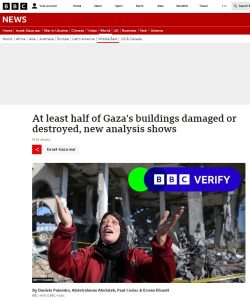
“More than half of Gaza’s buildings have been damaged or destroyed since Israel launched its retaliation for the Hamas attacks of 7 October, new analysis seen by the BBC reveals.
Detailed before-and-after imagery also shows how the bombardment of southern and central Gaza has intensified since the start of December, with the city of Khan Younis bearing much of the brunt of Israel’s military action. […]
Across Gaza, residential areas have been left ruined, previously busy shopping streets reduced to rubble, universities destroyed and farmlands churned up, with tent cities springing up on the southern border to house many thousands of people left homeless. […]
Further analysis, by BBC Verify, reveals the scale of destruction of farmland, identifying multiple areas of extensive damage.”
The information concerning buildings comes from sources who have previously worked with other media outlets to produce similar reports.
“Now, satellite data analysis obtained by the BBC shows the true extent of the destruction. The analysis suggests between 144,000 and 175,000 buildings across the whole Gaza Strip have been damaged or destroyed. That’s between 50% and 61% of Gaza’s buildings.
The analysis, carried out by Corey Scher of City University of New York and Jamon Van Den Hoek of Oregon State University, compares images to reveal sudden changes in the height or structure of buildings which indicate damage.” [emphasis added]
An important clarification concerning that highlighted wording – which is not provided to readers of the BBC Verify report – was given to CAMERA by Jamon Van Den Hoek in late December:
“When we double-checked with the researchers, Van Den Hoek reiterated that they only count structures as “likely damaged or destroyed” because, he explained, “we don’t yet have means of distinguishing categories of damage severity.””
Notably, three days after BBC Verify’s report appeared, the United Nations Satellite Centre – UNOSAT – published its own “assessment of the damage and destruction inflicted on structures in the Gaza Strip” which concluded that 30% (rather than 50% to 61% as claimed by the BBC) of the structures in the territory have been damaged since the beginning of the war. The breakdown given in that report states that 22,131 buildings (9.6% of the total number of structures) have been destroyed, 14,066 (6.1% of the total number of structures) severely damaged and 32,950 (14.3% of the total number of structures) moderately damaged.
The BBC Verify report presents several ‘case studies’, beginning with Khan Younis:
“The southern city of Khan Younis has been particularly badly hit in recent weeks, with more than 38,000 (or more than 46%) of buildings now destroyed or damaged, according to the analysis. Over the past fortnight, more than 1,500 buildings have been destroyed or damaged there.
Al-Farra Tower – a 16-storey residential block in the centre of the city, the tallest building in the area – was flattened on 9 January as can be seen in before-and-after images of the city’s skyline. Much of the neighbourhood in which it sits has been levelled by Israeli attacks since late December.
“Israeli forces targeted residential complexes, especially in the downtown Khan Younis area,” said Rawan Qaddah, a 20-year-old resident, who has been displaced and has lost contact with her family.
She named schools among the many buildings which had been damaged. Some were now being used to house displaced people temporarily.”
Readers are not informed why Rawan Qaddah was selected as a contributor, what qualifies her to provide the information uncritically promoted by the BBC or whether BBC Verify has in fact verified her claim concerning the alleged ‘targeting’ of “residential complexes”.
Moreover, BBC Verify’s report makes no mention of the fact that Israeli forces have been operating in Khan Younis since early December – or why. No mention is made of Hamas command and control centres in that city – which is home to Hamas leader Yahya Sinwar – or of the extensive tunnel network in which some of the Israeli hostages were held, the weapons production sites and rocket launching sites discovered there.
The only attempt to provide box-ticking context after a description and photos of a “damaged restaurant in Khan Younis” reads as follows:
“The IDF has repeatedly justified its actions by noting that Hamas deliberately embeds itself in civilian areas and explained destruction of buildings in the light of targeting fighters.”
Linking to another BBC report on a similar topic, the article goes on to tell readers that:
“Many of Gaza’s historic sites have suffered extensive damage, including the al-Omari Mosque originally built in the 7th Century.”
The context of Hamas’ use of mosques and other supposedly civilian facilities for military purposes and the fact that terrorists were operating in the vicinity of the al-Omari mosque at the time is not provided to readers.
The report then moves on to a section headed “Destruction to Gaza’s farmlands”.
“Further analysis, carried out by BBC Verify, shows large areas of previously cultivated land across Gaza have been extensively damaged.”
A case study is presented:
“BBC Arabic spoke to one farmer, Saeed, who fled south from Beit Lahia, in the north of Gaza, in mid-November.
The 33-year-old grew guava, figs, lemons, oranges, mint, and basil and earned about $6,000 (£5,535) from these crops every year – the only source of income for him, his father and his sister. He had tended to the farm, inherited from his grandparents, for 15 years.
But days after fleeing, he says he was told by a relative that the farm had been destroyed by the IDF, along with five surrounding homes which belonged to his relatives.”
While the exact location of Saeed’s farm is not given, readers would of course have been better placed to put the second-hand claims promoted by BBC Arabic via BBC Verify into context had they been told that Beit Lahia is also the location of a hospital used for terror purposes as well as rocket launching sites and that it is very close to the route of a 4km long, 50 meter deep tunnel discovered by the IDF.
Once again BBC Verify does box-ticking with a minimal response from the IDF:
“The IDF told us it had found Hamas tunnel entrances and rocket launch sites in various agricultural areas, adding that “operational needs require that these places be destroyed or attacked”.
“Environmental damage may be caused as a result of fighting and exchanges of fire.””
There is no doubt that in four months of war, considerable damage has been caused to structures and farmland in the Gaza Strip. One major reason for that is Hamas’ cynical exploitation of civilian homes and civilian infrastructure such as hospitals, universities, schools and mosques for military purposes including missile fire, along with its massive underground tunnel network which compromises the integrity of structures and land above it. Another significant part of the story – completely absent from BBC Verify’s report – is the fact that around 12% of the thousands of missiles launched by Palestinian terrorists have landed in the Gaza Strip.
BBC Verify, however, chose not to provide BBC audiences with that essential background, instead making do with a couple of short, generalised quotes from the IDF in order to tick the impartiality box and preferring to present audiences with a supposedly factual article that is blatantly one-sided and severely lacking in essential context.
Related Articles:

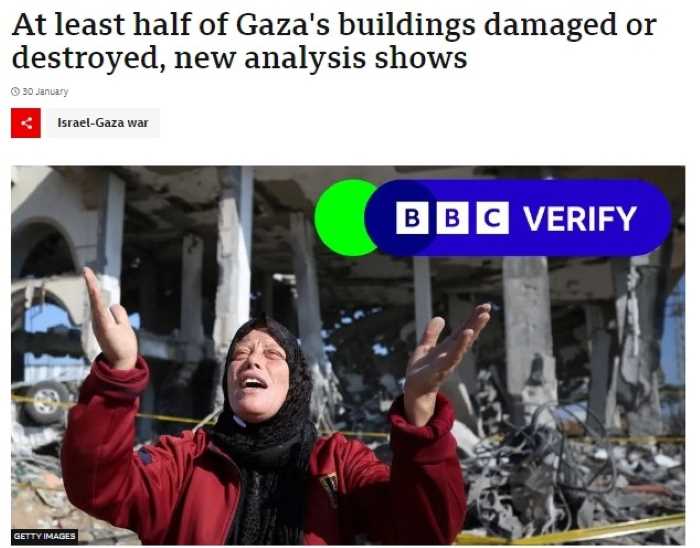
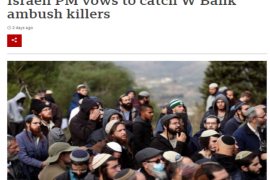

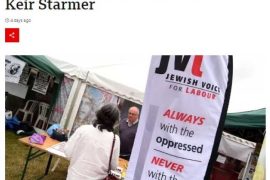
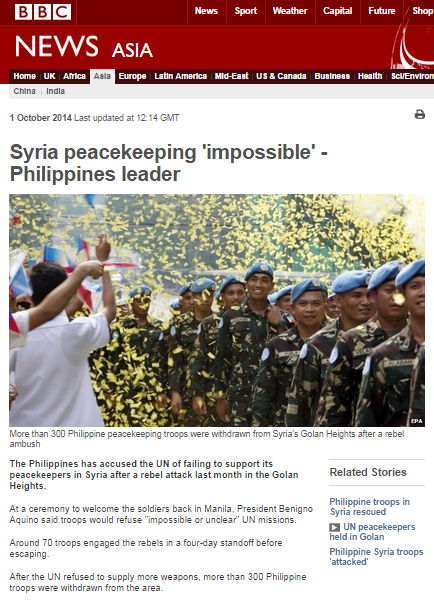
The BBC is incapable of being inpartial because of their desire to drip feed anti-Israel propaganda in every broadcast and document possible. In order to assist their adherence to Iranian demands for the long term Islamification of the UK. Now that they have Humza Yusuf in Scotland suggesting we take in thousands of terrorists from Gaza and London practically already radicalised with thousands of thugs roaming the streets and thus totally lost with the help of Sadiq Khan the Islamists are hoping for the success in the UK, that the IDF have had clearing out the inhuman Hamas fighters in Gaza. Of course providing sympathetic support to the 60,000+ each year illegal immigrants into the country (mainly young Muslim men) will of course speed up the process before the revolution finally comes. The government needs to ban the IRGC and depport anyone belonging to them #defundthebbc